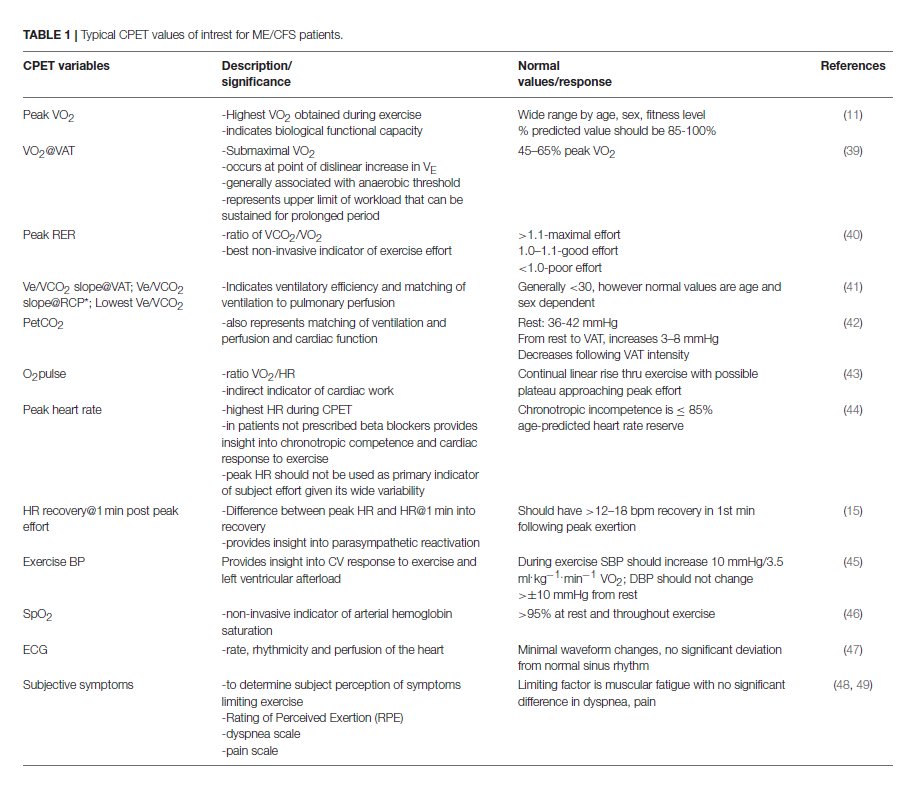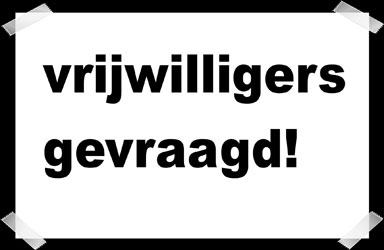Dr. Mark Guthridgde, Twitter, 1 juli 2020

1. Het probleem met Myalgische Encefalomyelitis/Chronisch Vermoeidheidssyndroom (ME/cvs) is, dat het belachelijk klinkt dat lichaamsbeweging patiënten zieker kan maken.
Hoe kan het dat lichaamsbeweging zo slecht is voor ME-patiënten, als het zo goed is voor bijna elke andere ziekte?
2. Nieuwe studie van de Workwell Foundation en Todd Davenport et al. tonen aan dat ME/cvs-patiënten metabole defecten hebben die niet verklaard kunnen worden door bewegingsangst, deconditionering, of ‘ziekteovertuigingen’.
ME-patiënten hebben verminderd zuurstofverbruik tijdens inspanningstesten.
https://content.iospress.com/articles/work/wor203170
Properties of measurements obtained during cardiopulmonary exercise testing in individuals with Myalgic Encephalomyelitis/Chronic Fatigue Syndrome
Abstract Diminished cardiopulmonary exercise test (CPET) performance indicates the physiological basis for reduced capacity for activities of daily living and work. Thus, it may be a biomarker for Myalgic Encephalomyelitis/Chronic Fatigue Syndrome (ME/CFS). To determine statistical properties of cardiac, pulmonary, and metabolic measurements obtained during CPET in people with ME/CFS.
3. ME-patiënten hebben een verminderd vermogen om hun zuurstofverbruik te verhogen tijdens inspanning. Dit is totaal anders dan elke andere ziekte die we kennen waaronder cardiovasculaire ziekten, longziekten, nierfalen in het eindstadium, hypertensie en mucoviscidose
https://translational-medicine.biomedcentral.com/articles/10.1186/1479-5876-12-104
Inability of myalgic encephalomyelitis/chronic fatigue syndrome patients to reproduce VO 2 peak indicates functional impairment
Myalgic Encephalomyelitis/Chronic Fatigue Syndrome (ME/CFS) is a multi-system illness characterized, in part, by increased fatigue following minimal exertion, cognitive impairment, poor recovery to physical and other stressors, in addition to other symptoms. Unlike healthy subjects and other diseased populations who reproduce objective physiological measures during repeat cardiopulmonary exercise tests (CPETs), ME/CFS patients have been reported to fail to reproduce results in a second CPET performed one day after an initial CPET.
Onvermogen van ME/cvs-patiënten om piek-VO2 te reproduceren, wijst op functiebeperking
4. En ME/cvs-patiënten vertonen ook een verstoord zuurstofverbruik en een verlaagde anaerobe drempel in vergelijking met multiple sclerose.
ME/cvs-patiënten zijn #ZiekNietGedeconditioneerd, #ZiekNietMoe, #ZiekNietZwak
https://onlinelibrary.wiley.com/doi/abs/10.1111/cpf.12460
Physiological measures in participants with chronic fatigue syndrome, multiple sclerosis and healthy controls following repeated exercise: a pilot study
Purpose To compare physiological responses of chronic fatigue syndrome (CFS/ME), multiple sclerosis (MS) and healthy controls (HC) following a 24‐h repeated exercise test. Methods Ten CFS, seven M…
Fysiologische metingen bij deelnemers met chronisch vermoeidheidssyndroom, multiple sclerose en gezonde controles na herhaalde inspanning: een pilootstudie.
5. Inspanningstesten bieden een verklaring waarom ME/cvs-patiënten kunnen crashen, zelfs na een bescheiden inspanning. De verminderde aerobe capaciteit van ME-patiënten resulteert in een omschakeling naar anaeroob metabolisme dat waarschijnlijk van invloed is op het vermogen om eenvoudige dagelijkse taken uit te voeren.
https://www.frontiersin.org/articles/10.3389/fped.2019.00082/full
Chronotropic Intolerance: An Overlooked Determinant of Symptoms and Activity Limitation in Myalgic Encephalomyelitis/Chronic Fatigue Syndrome?
Post-exertional malaise (PEM) is the hallmark clinical feature of myalgic encephalomyelitis/chronic fatigue syndrome (ME/CFS). PEM involves a constellation of substantially disabling signs and symptoms that occur in response to physical, mental, emotional, and spiritual over-exertion.
Chronotrope intolerantie: een over het hoofd geziene determinant van symptomen en activiteitenbeperking bij ME/cvs?
6. En ME/cvs-patiënten kunnen ‘crashen’ als ze zich teveel inspannen wat resulteert in een postexertionele malaise (PEM).
Het uitlokken van PEM vermindert de drempel waarop het anaeroob metabolism versnelt, wat het vermogen van de patiënten hindert om niet-inspannende taken te doen.
https://translational-medicine.biomedcentral.com/articles/10.1186/1479-5876-12-104
Onvermogen van ME/cvs-patiënten om piek-VO2 te reproduceren, wijst op functiebeperking
7. En inspanning die PEM bij ME/cvs-patiënten uitlokt, leidt tot een aanhoudende immunologische, inflammatoire respons die anders is dan bij sedentaire of gedeconditioneerde mensen.
#ZiekNietMoe
https://journals.plos.org/plosone/article?id=10.1371/journal.pone.0197811
Deconstructing post-exertional malaise in myalgic encephalomyelitis/ chronic fatigue syndrome: A patient-centered, cross-sectional survey
Background Post-exertional malaise (PEM) is considered to be the hallmark characteristic of myalgic encephalomyelitis/ chronic fatigue syndrome (ME/CFS). Yet, patients have rarely been asked in formal studies to describe their experience of PEM.
Deconstructie van postexertionele malaise bij ME/cvs: een patiëntgericht, cross-sectioneel onderzoek
8. Mensen gebruiken het aeroob metabolisme voor de meeste dagelijkse activiteiten zoals wandelen en zittende taken. Maar een verminderde aerobe capaciteit van ME/cvs-patiënten dwingt waarschijnlijk tot een omschakeling naar een minder efficiënt anaeroob metabolisme wat leidt tot voortijdige vermoeidheid en PEM.
https://www.frontiersin.org/articles/10.3389/fped.2018.00242/full
Cardiopulmonary Exercise Test Methodology for Assessing Exertion Intolerance in Myalgic Encephalomyelitis/Chronic Fatigue Syndrome
Background: Concise methodological directions for administration of serial cardiopulmonary exercise testing (CPET) are needed for testing of patients with Myalgic Encephalomyelitis/Chronic Fatigue Syndrome (ME/CFS). Maximal CPET is used to evaluate the coordinated metabolic, muscular, respiratory and cardiac contributions to energy production in patients with ME/CFS.
Cardiopulmonaire inspanningstestmethodologie voor het bepalen van inspanningsintolerantie bij ME/cvs
9. Inspanningsstudies tonen ook dat een toegenomen afhankelijkheid van anaeroob metabolisme bij ME/cvs-patiënten resulteert in verhoogde metabolieten zoals melkzuur, wat waarschijnlijk leidt tot een onvermogen om werk vol te houden en een vermindering in activiteit.
https://academic.oup.com/ptj/article/93/11/1484/2735315
Discriminative Validity of Metabolic and Workload Measurements for Identifying People With Chronic Fatigue Syndrome
The absence of reliable diagnostic laboratory tests or biomarkers often presents significant problems for people with chronic fatigue syndrome (CFS), treating clinicians, and the CFS research community. The nature of conditions characterized by chronic fatigue and pain, such as CFS and fibromyalgia, a common comorbidity, poses a special challenge for physical therapists, in part because fatigue is often associated with deconditioning.
10. Fysiotherapeuten/Kinesitherapeuten moeten zich er bewust van zijn dat postexertionele malaise (PEM) bij ME-patiënten te wijten is aan objectief meetbare defecten in het metabolisme.
Dus ja, lichaamsbeweging is gunstig voor bijna elke ziekte, maar de wetenschap toont dat ME/cvs de uitzondering is.
https://academic.oup.com/ptj/article/93/11/1484/2735315
Deze review van de Workwell Foundation in Frontiers bespreekt hoe cardiopulmonaire inspanningstesten (CPET) gebruikt kunnen worden om ME/cvs te helpen diagnosticeren en onderzoeken. Deze tabel biedt een nuttige lijst van definities voor patiënten en dokters om ME/cvs te onderzoeken.
https://www.frontiersin.org/articles/10.3389/fped.2018.00242/full
Cardiopulmonaire inspanningstestmethodologie voor het bepalen van inspanningsintolerantie bij ME/cvs

© Stevens et al., 2018. Tabel 1.
© Dr. Mark Guthridge. Vertaling Zuiderzon, redactie Abby, ME-gids.
https://twitter.com/Dr_M_Guthridge/status/1278308004845109249
null
1/ The problem with Myalgic Encephalomyeltis/Chronic Fatigue Syndrome #MECFS is that it seems so ridiculous that exercise could actually make patients worseHow can exercise be so bad for #pwME but so good for almost every other serious illness?THREAD







